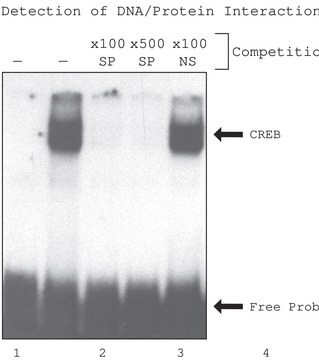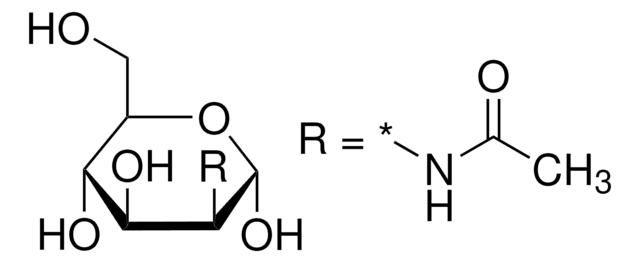G0500
D-(+)-Galactosamine hydrochloride
≥99% (HPLC)
Synonym(s):
2-Amino-2-deoxy-D-galactopyranose hydrochloride, D-Chondrosamine hydrochloride
About This Item
Recommended Products
Quality Level
Assay
≥99% (HPLC)
form
powder
technique(s)
HPLC: suitable
impurities
≤0.5% Glucosamine (HPAE)
color
white to off-white
mp
172-180 °C
solubility
H2O: 50 mg/mL, clear to slightly hazy, colorless to very faintly yellow
storage temp.
room temp
SMILES string
Cl.N[C@@H](C=O)[C@@H](O)[C@@H](O)[C@H](O)CO
InChI
1S/C6H13NO5.ClH/c7-3(1-8)5(11)6(12)4(10)2-9;/h1,3-6,9-12H,2,7H2;1H/t3-,4+,5+,6-;/m0./s1
InChI key
CBOJBBMQJBVCMW-NQZVPSPJSA-N
Looking for similar products? Visit Product Comparison Guide
General description
Application
- for the surface binding of mannan-binding lectin (MBL) to modified mica surfaces
- in sterile phosphate buffer saline (PBS) before the intraperitoneal injection
- in mice for the generation of primary bone marrow-derived macrophages (BMDMs)
Biochem/physiol Actions
Other Notes
Storage Class Code
11 - Combustible Solids
WGK
WGK 3
Flash Point(F)
Not applicable
Flash Point(C)
Not applicable
Personal Protective Equipment
Certificates of Analysis (COA)
Search for Certificates of Analysis (COA) by entering the products Lot/Batch Number. Lot and Batch Numbers can be found on a product’s label following the words ‘Lot’ or ‘Batch’.
Already Own This Product?
Find documentation for the products that you have recently purchased in the Document Library.
Customers Also Viewed
Our team of scientists has experience in all areas of research including Life Science, Material Science, Chemical Synthesis, Chromatography, Analytical and many others.
Contact Technical Service
